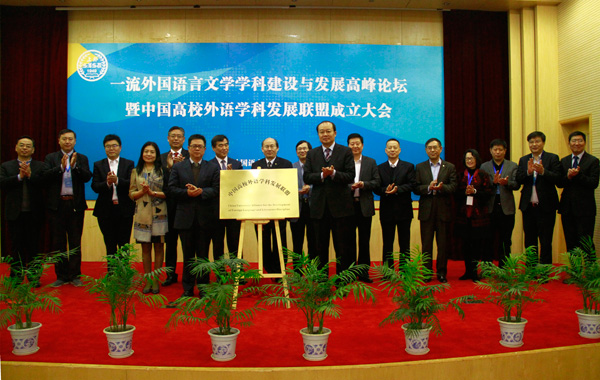New alliance to boost cross-cultural cooperation


An alliance comprising 153 Chinese universities that specialize in foreign languages and literature was established on Saturday in Shanghai.
The China University Alliance for the Development of Foreign Language and Literature Discipline (CUAFLL) will spearhead the formulation of policies to further develop foreign languages specializations in China as well as foster cooperation among universities in the country in areas such as construction, innovation and management.
Li Yansong, councilor of the alliance and principal of Shanghai International Studies University, said that the alliance will play a key role in producing multilingual professionals who can facilitate cross-cultural cooperation as part of the Belt and Road Initiative. He added that conventional courses on foreign language education are also unengaging and outdated, resulting in low employment rate among students who have such majors.
“In light of the Belt and Road Initiative and the goal to showcase Chinese culture to the world, foreign language studies are important to how China communicates to the world,” said Li.
“Through the alliance, we hope to bolster the quality of foreign language education. This initiative will also help cultivate more talents and strengthen our exchanges with global universities.”
Zong Wa, deputy secretary-general of the China Education Association for International Exchange, said quality foreign language education would provide strong language support to Chinese universities and their collaborations with foreign education institutions.
Zong noted that there were, as of the end of October 2017, about 1,300 university projects between China and foreign countries. Most of the students are taught bilingually or in foreign languages. A survey on the internationalization of China’s higher education in 2017 indicated that more than 3,000 courses in the country are taught in English.
“The establishment of this alliance is vital to facilitating related studies on more languages used in countries worldwide,” said Yan Guohua, vice principal of Beijing Foreign Studies University.
The Beijing Foreign Studies University is presently providing education and research on 84 foreign languages and the countries where they are spoken.
“By 2020, this figure will exceed 100 as we embrace the official languages of all countries that have diplomatic ties with China,” said Yan.
- Foreigners check-in to China for hospital expertise
- Forum underlines cross-Strait exchanges
- China, Uruguay vow to deepen ties
- Hunan achieves record grain output in 2025
- Thai students to train in China as universities expand high-speed rail cooperation
- China unveils world's fastest full-size humanoid robot





































